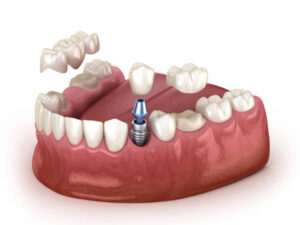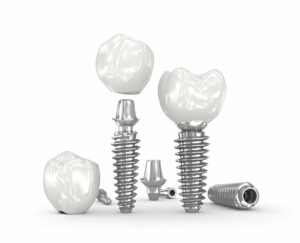Dental implants are often praised as a great solution for replacing lost teeth. They have an impressive success rate, which makes them popular. However, many who are considering this treatment might pause and ask, “Can my mouth reject an implant?” You must address these worries well. They are pivotal to making an informed decision about this dental option.
What Is a Dental Implant?
A Dental implant is essentially a small, sturdy post made from titanium, often used to replace the root part of a missing tooth. On top of this metal post, a crown or dental prosthesis is placed, which looks and functions like a natural tooth. Implants are known for their durability. They integrate into the bone structure. They offer a permanent solution to tooth loss.
Can Implants Be Rejected?
Strictly speaking, the term ‘rejection’ might not be scientific. But, there are cases where an implant fails to join with the jawbone. It’s important to note that such occurrences are quite rare, with success rates hovering around 98%.
Reasons Behind Implant Complications
- Allergic reactions to titanium are rare. But, some people may discover they are allergic. Titanium is the material most commonly used for implants. This can lead to irritation and discomfort, potentially compromising the implant’s success.
- Infection:is caused by bacteria gathering at the implant site. It can lead to infection, which inflames and weakens the surrounding tissue. This scenario can prevent the implant from bonding correctly with the jawbone.
- Improper Bone Integration:For an implant to succeed, it must undergo osseointegration. This is where the implant integrates with the bone. Sometimes, this doesn’t go as planned. This can be due to factors such as bone quality, diseases like osteoporosis, or habits like smoking.
Symptoms to Watch For
If you’re concerned about how your body is reacting to an implant, there are a few symptoms to be vigilant about:
- Mobility: Any movement of the implant should be taken seriously.
- Discomfort or Pain: Persistent pain around the implant area, especially when touched, could be a sign of trouble.
- Swelling or Redness: These are signs of inflammation, possibly due to infection or improper healing.
Preventing Implant Failure
While the risk of implant failure is low, taking proactive steps can further decrease this risk:
- Adequate Oral Hygiene: Regular brushing and the use of alcohol-free mouthwash can help keep bacteria at bay.
- Regular Dental Check-ups:. They let dentists find and fix issues early.
- Lifestyle Adjustments: Smoking can interfere with the healing process, and as such, should be avoided.
Consultation and Aftercare
Selecting a proficient and seasoned dental surgeon is crucial for the success of your implant procedure. Be transparent about your medical history and any reservations during your consultation. After the surgery, follow all the aftercare guidelines your dentist gives you. They are key to the best results for your implant.
Conclusion
In summary, while the rejection of a dental implant is not common, it is a possibility. Being informed about the reasons for implant failure and knowing the symptoms to look out for can help you address issues promptly. With proper care and consultation, dental implants continue to be a reliable and effective solution for tooth loss.
In crafting this article, we’ve focused on providing simple information. It’s easy to understand no matter how familiar you are with dental procedures. The language is simple. It focuses on engaging the reader directly. It avoids technical jargon and uses a conversational tone. This tone aligns with the everyday experiences of those considering or preparing for a dental implant.
Schedule Your Consultation at Aberdeen Dental Implant Clinic
Ready to take the next step towards a perfect smile? Contact Aberdeen Dental Implant Clinic today to schedule your consultation. Our team of experts is here to guide you through the process and ensure the best possible results for your dental implants. Don’t wait, reach out now and transform your smile with confidence!
Frequently Asked Question
Can your mouth reject an implant?
While rare, it’s possible for the body to reject a dental implant, similar to other medical procedures. However, proper care and follow-up with your dentist can minimize this risk.
What is the success rate of dental implants?
Dental implants have a success rate of over 95%, making them a highly reliable tooth replacement option.
Is the implant procedure painful?
The implant procedure is usually done with local anesthesia. This ensures little discomfort during the surgery. Any post-operative discomfort can usually be managed with pain medication.
How long does it take to recover from dental implant surgery?
Recovery time varies for each individual but generally takes a few days to a week. Your dentist will provide instructions for post-operative care to help speed up the healing process.
Are dental implants covered by insurance?
Many dental insurance plans cover dental implants. But, it’s best to check with your provider to understand the coverage and costs.





